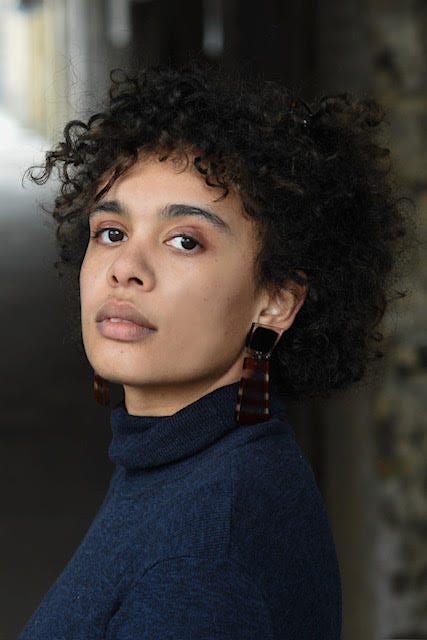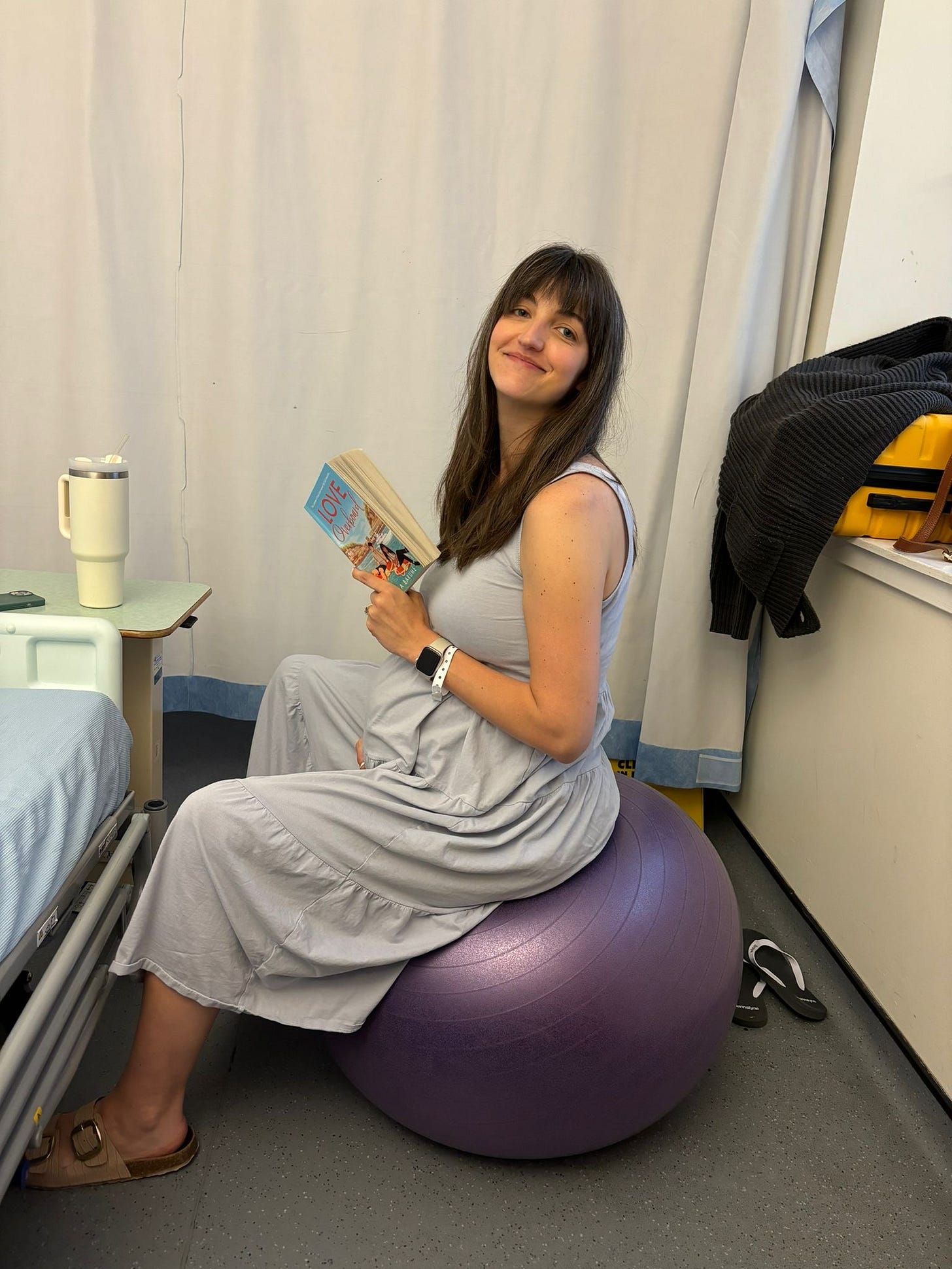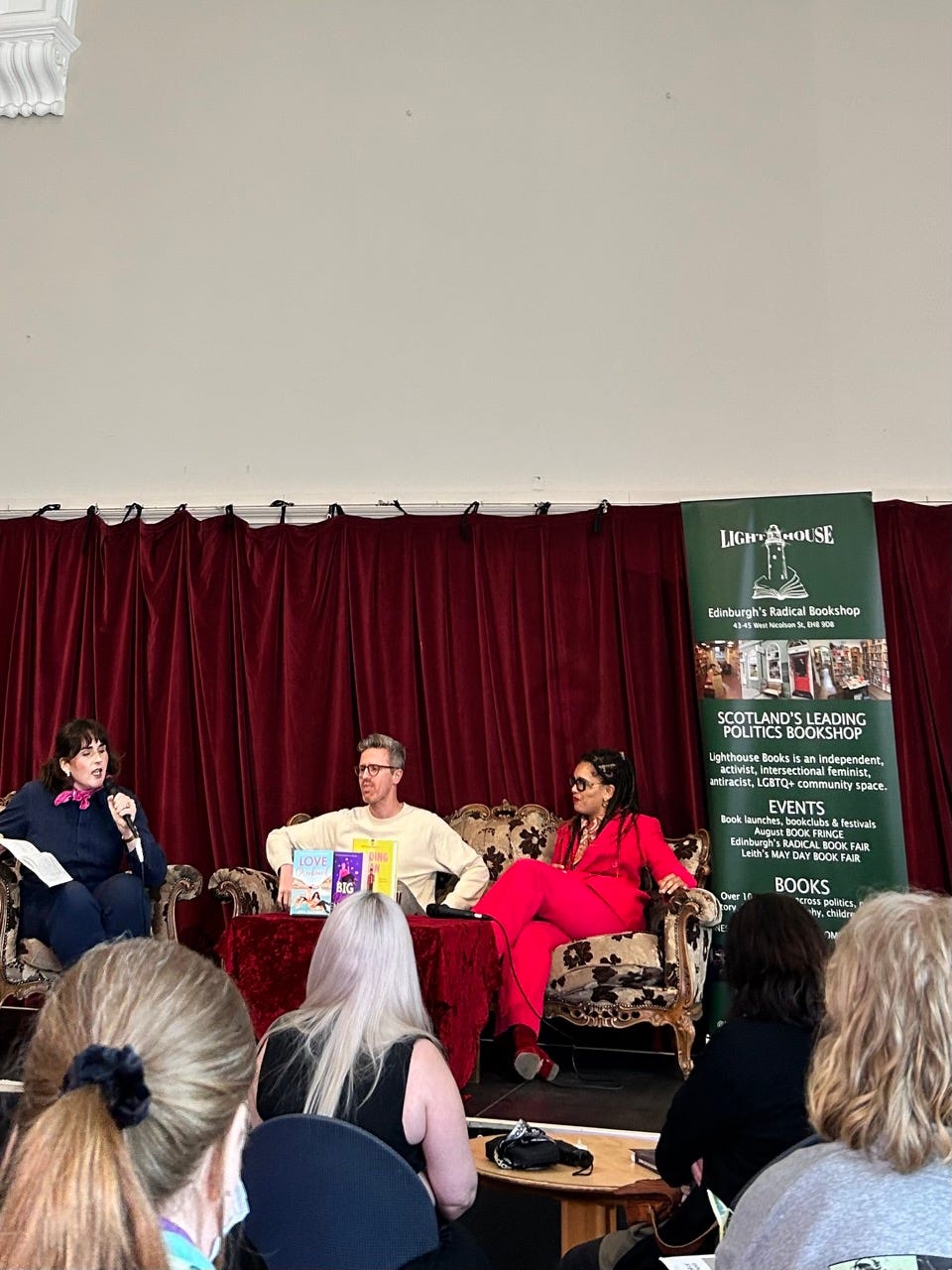"I try to think of them like friends, in the way that you usually try and understand [them]...look at their actions with less judgment and more empathy."
Ada Barumé shares how she moved to her Second Chapter through an IP novel.
Fun fact: I finished Ada Barumé’s debut novel, Love Overboard, bouncing on a ball last month at the beginning of my labour*. It was a delicious storyline with sweet and spicy characters that was the perfect distraction to what was going on around me.
Second fun fact is that Ada Barumé has the best taste in suits**! I saw her and
on a panel in June at Lighthouse Bookshop’s First Date Romance Festival discussing their latest books. Ada’s energy, quick humour and personal anecdotes left the audience feeling like we all immediately made a great new friend. Her book, Love Overboard, has a similar vibe.When I reached out to Ada to be included in this interview series she mentioned Love Overboard was an IP novel, something I had never heard of before. Read on below to find out what drove Ada to write a book, how she published via the IP pathway, and what she learned along the way.
Let’s start in the past. Tell us about your pre-author career journey.
So, I‘m actually still in my pre-author career journey! It’s currently a side by side situation, I’m not making enough from writing to quit the day job yet! I graduated with a politics and sociology degree from Cambridge, then had to move back home where I spent about a year on a casual contract as a TV researcher. I then went and did a journalism masters degree and ended up working for AFP news agency for two years. Then I went freelance for a bit, and have pivoted into podcast producing. Which is what I currently do at Tortoise Media.
Did you have any preconceived notions / myths about becoming a writer? How did you overcome those?
I have always liked writing, and I had written some short stories, but the biggest thing I had to overcome was the idea that it is somehow ‘totally different’ to write a whole book. In the words of my lovely editor, ‘it’s actually nicer to be able to indulge’ and she was right! I have also always been best at writing to theme - I LOVE a writing prompt, the openness of writing about ‘anything’, terrifies me! I also assumed there would be more money in it… but more on that later!
Juggling anything with a day job is hard work, especially something as in-depth as writing a book. Can you set the scene for what your life looked like when you started writing?
It was October 2023, and I had been applying for new jobs for about a year with little success. My work at AFP was on the video desk and when the Ukraine war broke out I was working on the Europe team. Suffice to say, some of the stuff that was playing on my screen all day was pretty horrific, and it was taking a toll. I started going to therapy to try and deal with some of the stuff I was having to see, and then a few months into the war, a colleague of mine who was stationed out there was killed in an airstrike. It was tragic and shocking and totally devastating for our small team.
There were a lot of other things going on at the time, but the long and short of it is: I was unhappy, maybe even borderline depressed.
But anyway, after a few more months, I took the plunge, I couldn’t keep waiting for everything to be perfect and to have a job lined up, I had to quit. So I did.
I had two months of notice period to work, but mentally I had checked out, and that’s when Amy came into play. Amy is a commissioning editor at Harper Collins, she was also the editor-in-chief of Bad Form, which I used to write for, and she’s (now) a friend. Amy posted a call out on instagram (of all places) asking if she knew any black or brown women who’d be up for writing an IP novel.
It felt a bit like a sign, I had handed in my notice the day before! So I replied, cautiously, lots of ‘I’m probably not the right person for the job but I’m going to throw my hat in the ring’. A week later I’d sent in a sample chapter, and the week after that I was signing the contract!
A real whirlwind.
The catch? I had to write the book in 8 weeks, so a lot was written whilst I was working, but the last three weeks I was writing full time (in between sending off job application and chasing up freelance work).
Did your first career help in your writing at all?
As a video journalist and now audio producer, the main way in which I write is through scripting. But writing for the spoken word I think has helped me a lot when writing dialogue. I also like to say that journalism is just novel writing in reverse - for me anyway. When I am researching or investigating a story I start with the event, the thing that happened and then I have to trace the origins of that event back to the people, try and find out their motivations and uncover the context. When I write fiction, I usually start with the characters and the context and then I have to work out how to get them to ‘do the things’, to make the event, or storyline happen. So I think it’s a similar kind of way of thinking about people, and having a general curiosity about what motivates them.
Did you employ any tips and tricks to help you write? If so, what were they?
No tricks I’m afraid! The way I write, I flesh out my characters, sort of get to know them, and then I just watch them interact with each other and write it down! I try to think of them like friends, in the way that you usually try and understand your friends, and look at their actions with less judgment and more empathy.
A huge element of writing and the path to publishing comes from a cultivated community. What is your writing community like and how did you find it?
I owe a lot to Amy and to Bad Form Review, which is the literary review magazine that Amy was editor of. The premise of the magazine was to draw attention to the underrepresentation of writers from racialised and minority ethnic backgrounds in publishing. Over the course of the 5 years the magazine ran, that number grew greatly and the Bad Form reviewers, who themselves were writers of colour, were able to amplify those releases. Without the opportunity to write for the magazine, short stories, poems and articles, and the support of that community, through events and readings, I wouldn’t have had the confidence to submit the sample and ultimately publish my very own book!
I have to confess, I haven't heard of an IP novel before! Could you tell us about that process?
So an IP novel is one where the ‘intellectual property’ belongs to the publisher, in this case Avon. That basically means that when I agreed to write the sample I was sent a plot and character outline (around 3 sides of A4). I was also asked if I wanted to use my own name or a pen name, IP authors do both! I have a fair amount of leeway for some aspects of the book, (eg, I changed some of the timeline, and some plot points were only as specific as ‘something needs to happen for them to share a cabin’). With a lot of the characters apart from Sofia and Jack, I also had free reign. Aspects that were set in stone were the setting, the female protagonist being black and a chef, and it following an ‘enemies to lovers’ plot line.
Logistically the differences are that I get a smaller royalties cut (6% rather than 10%). But then I don’t have an agent to pay. I get more direction for the story (which is great for me) and it’s a far smoother ride to getting published. Avon are already confident in the idea so there’s no persuading to do!
What would you recommend to others who are considering publishing?
If you love writing, and you love developing stories and characters but you’re not totally married to telling a specific story, IP is a really great way to get into it. There are a few publishing houses, like Avon, that will do public call outs, so follow them on social media! Some authors I’ve met write 2-3 books a year, sometimes under different pseudonyms, so it’s more widespread than you’d think. It is fast paced though, be warned.
To be able to pivot any career, there’s usually a supporting financial element tied to it. Did you have any financial support that helped you on your journey? Could you share what that looked like?
I had been saving for a while when I worked at AFP, so I was able to cover my expenses for two months whilst I was writing and not working. After that I freelanced until I found my current job. Currently to finish my second book, I am looking at having to take unpaid leave for a few weeks to get my manuscript done, but I have tried to write every other weekend (which is not always very fun, especially when the sun is out). Sadly, there’s not really a way for me to cover my living costs by writing alone.
There’s also a blackhole when it comes to how much authors make, enabling a myth that once you’re a published author you can write full-time as the only source of income. But it's not always that simple or linear! Could you tell us a bit more about how this is working for you financially?
I’m still working full time! Which is about 90% of my income. As I also have a lower royalty share it’ll take me longer to earn out my advance and start getting paid (if at all). Suffice to say I’m not ‘doing it for the money’ and I think I probably wouldn't be able to even think about writing full time until I can write my own stuff, which is part of the plan in the future!
Time to put on your wise Hindsight Glasses. What advice would you give to aspiring authors?
As my experience of getting published is a little unusual, it’s hard not to chalk a large chunk of it up to luck, but I would say that having written whenever I got the chance (short story competitions, magazines, other online platforms) made me feel quite confident in my ability to adapt to the task, and when it comes to IP its all about writing to brief!
What did you learn about yourself during this process?
I learnt that I can write a book! And that my favourite part of writing is character work, I’d often have to stop myself from just writing pages and pages of conversation or internal monologue and get back to them actually doing things. Writing those scenes gave me the same satisfying feeling as having a long conversation with a good friend.
Thanks so much to Ada for being on Second Chapter! If you haven’t read her book, LOVE OVERBOARD, add it to your TBR pile now. You can follow Ada on Instagram @aid_are_bar_room_may.
*Bouncing away!
** Fabulous suit!
If you liked this Second Chapter interview, please consider liking, commenting or sharing with your friends and family who love to write and / or read. Appreciate all the support we can get! :)




